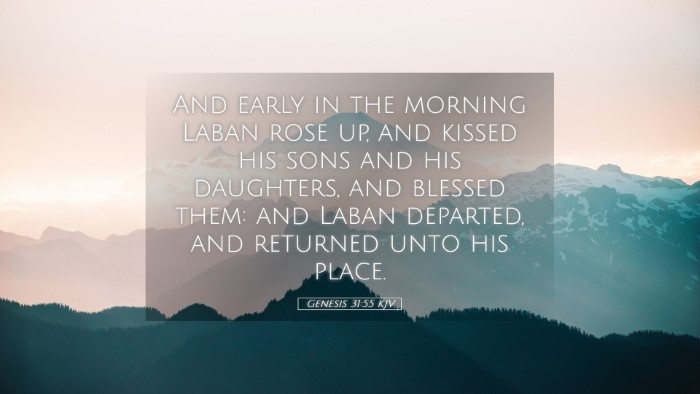Commentary on Genesis 31:55
Verse Context: Genesis 31:55 states, "And early in the morning Laban arose, and kissed his sons and his daughters, and blessed them; and Laban departed, and returned unto his place." This moment captures the tension and familial dynamics central to the narrative of Jacob and Laban.
Introduction
This commentary seeks to explore the theological and practical implications of Genesis 31:55 by synthesizing insights from various public domain commentaries. Understanding this verse within the larger context of Genesis provides insight into the themes of family, covenant, and the divine protection that permeate this passage.
The Departure of Laban
Understanding Laban's Actions: Laban's early morning actions indicate a sense of urgency as he kisses his family and blesses them before departing. This act serves as both a familial connection and an acknowledgment of the shifting dynamics following Jacob's successful departure.
- Matthew Henry: Henry notes that Laban’s farewell is marked not by anger but by genuine familial love, highlighting Laban’s complex character—one who is both a shrewd negotiator and a loving parent.
- Albert Barnes: Barnes emphasizes the emotional weight of Laban’s parting, suggesting that it symbolizes a deeper concern for the familial ties that Jacob is to sever as he separates from Laban’s influence.
- Adam Clarke: Clarke points out that Laban’s blessing could be seen as seeking divine favor upon his offspring, reflecting Laban's own acknowledgment of God’s role in their lives despite his previous actions toward Jacob.
The Significance of Morning
The choice of the morning as the time for Laban's departure carries symbolic weight. Mornings often represent new beginnings, suggesting a transition not only for Laban but also for Jacob as he embarks on a new phase in his life.
- Matthew Henry: Henry observes that the morning symbolizes both the end of Laban’s connection to Jacob and the beginning of Jacob’s new journey, focusing on the providence of God which guided Jacob throughout his years of servitude.
- Albert Barnes: Barnes mentions that mornings in biblical narratives often signify clarity and decision-making, indicating Laban’s resolve to part ways with Jacob after their conflict.
The Blessing as a Covenant
In this verse, Laban’s blessing acts as a significant covenantal moment, intertwining the personal and the spiritual. As Laban kisses his children, it is reminiscent of the patriarchal blessings that are foundational in the covenant relationship with God.
- Adam Clarke: Clarke reflects on the cultural importance of blessings in the ancient Near Eastern context, suggesting that Laban’s blessing is not mere formality but carries immense weight, signaling God’s providential favor.
- Matthew Henry: Henry contemplates how Laban’s act can be seen as a recognition of Jacob’s faithfulness, underscoring a moment of considerable transition for both families as Jacob takes his rightful place in God’s plan.
Family Dynamics and Tension
Laban’s interactions with his family embody the complexities of familial relationships. The farewell seems bittersweet, and it reflects the broader narrative of tension and unresolved conflicts between Jacob and Laban.
- Albert Barnes: Barnes elucidates how this moment represents the culmination of Laban's attempts to retain Jacob while simultaneously acknowledging that Jacob must move forward as directed by God.
- Matthew Henry: Henry suggests this scene starkly contrasts with Jacob’s earlier deceptions, showcasing growth and maturity in Jacob’s character despite the familial struggle.
Conclusion
Genesis 31:55 encapsulates a poignant moment of farewell filled with familial love and divine acknowledgment. The verse serves as a testament to the complexities of relationships and the overarching narrative of God’s faithfulness amidst human conflicts. For scholars, pastors, and theologians, this exploration emphasizes the importance of familial ties, divine blessing, and the pivotal role of God in personal and communal destinies.
In the larger theological discourse, the themes in this verse resonate with the relevance of blessings, covenants, and the moral implications of family dynamics in the context of faith and obedience.


